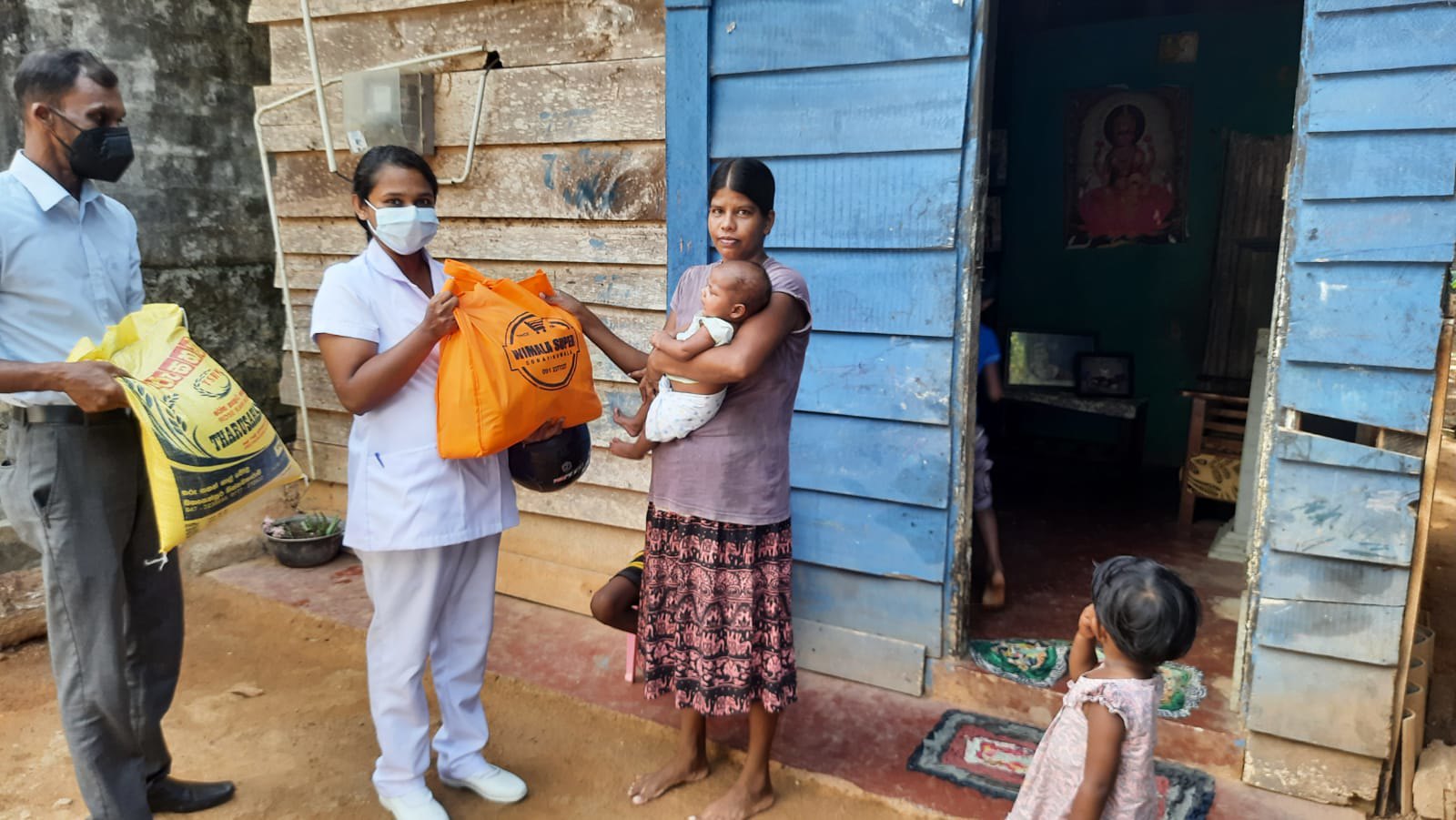A project with Shraddha Charity Organization provided much-needed food to pregnant women and new mothers in Sri Lanka.
By Shae Davidson
The Shraddha Charity Organization (SCO) is a Sri Lankan Buddhist nonprofit dedicated to helping the helpless in times of need. The organization is affiliated with the Mahamevnawa monastic network. Over the past two years, support from Buddhist Global Relief has helped SCO expand the vital health and education support it offers families in Sri Lanka to include nutritional assistance for expectant mothers. Maternal and child malnutrition affect approximately half of the world’s population and is directly connected to the need for women’s empowerment. The problem has become much worse as COVID has made it harder for Sri Lankan workers to maintain their jobs even as the price of food has skyrocketed.
The effort to combat maternal malnutrition builds on SCO’s history of helping at-risk families gain access to clean water, support talented but economically marginalized students, and provide compassionate aid to those in need. SCO recognizes the complexity of the issues it faces—particularly the interplay of forces that drive and maintain poverty—and works closely with other community groups and beneficiaries to find effective, sustainable ways to reduce suffering.
The “Assisting Malnourished Pregnant Mothers Across Sri Lanka” initiative sponsored by BGR brought together a wide range of supporters to help economically disadvantaged pregnant women. Pregnant women with three or more children were eligible for the program. Those who qualified participated for a year, receiving nutritional aid during the last six months of pregnancy and the first six months of the newborn’s life. Monks at the Mahamevnawa Buddhist Monastery coordinated many aspects of the program, working with lay people to package a month’s worth of rations for each family. Physicians from cooperating public health agencies gave advice on nutrition, met with pregnant women to monitor their health, and made home visits to help evaluate each family’s progress.
Despite some logistical challenges posed by COVID, the project has grown to help 24 families, improving the lives of a total of 118 people. BGR’s grants to SCO provided funding for 20 of the 24 families who participated.
The simple packets of dry rations had a huge impact on the wellness of SCO’s beneficiaries. A 38-year-old woman who worked as a manual laborer to support her four children, for example, already faced nutritional insecurity when she learned she was pregnant with a fifth child. She developed anemia, and her declining health made it more difficult for her to support her family. While she was on the brink of a vicious downward spiral of poverty and ill health, support from SCO provided healthy meals to the woman and her children and helped ease the physical and emotional stress they faced.
Many participants similarly affirmed that the program provided essential nutritional aid and emotional comfort. “We live off a three-wheel taxi-driver’s salary,” one woman said. “Now, because everything is so expensive, it’s really not possible to say how valuable the goods we’ve received have been for us. Over these past months they have helped us survive during this difficult time.” The assistance has become all the more valuable as Sri Lanka faces new economic challenges caused by a fuel shortage.
The maternal nutrition project—like SCO’s other health and education programs—has grown and evolved to reflect the needs and inputs of the people it serves. While initially focused on food aid, support from BGR has allowed SCO to give strollers, cribs, and other maternity goods to families.
“I’m happy raising my four children,” one participant reported, “but three weren’t so lucky to get to ride in a stroller. I didn’t have enough money to buy one. I really wanted to get one for my kids, but with things as they are, and my husband’s job, there was just no way. I’m really happy that Buddhist Global Relief gave this. They should receive more and more help. Keep doing more to give things to poor people like us.”
Representatives from SCO and its partner organization, Sonduru Sihinayaka Urumaya, frequently visited the women who participated in the program to evaluate their well-being and support them as they breastfed their newborns for the first six months of life. As project staff members visited families to assess the effects of the maternal nutrition program, the women also took time to discuss their needs and explore other areas of opportunity. A family visit in Mahapothana, Kahatagasdigiliy, for example, led to the creation of a program to give grants to families who wish to cultivate abandoned farmland near their homes. A passing observation led directly to a program that helps 20 families become healthier and more self-sufficient.
According to SCO, “this project has brought unspeakable comfort and relief to the lives of the women and has been instrumental in improving the nutritional status of the entire family.” Beneficiaries agree, with one parent explaining, “I have four children. Somehow I have to support them by righteous means. Truly, over the past year to have received food and such like this is a huge help. If we had such money and we went to buy these things, we wouldn’t be able to do it easily. Buddhist Global Relief has donated food supplies to us. As they have done a huge service for me, may they receive more and more appreciation for their efforts.”
Shae Davidson holds a PhD degree in American history. His dissertation research explored the importance of inclusive community partnerships in building food systems. He has served as a museum director and taught history and public policy.





